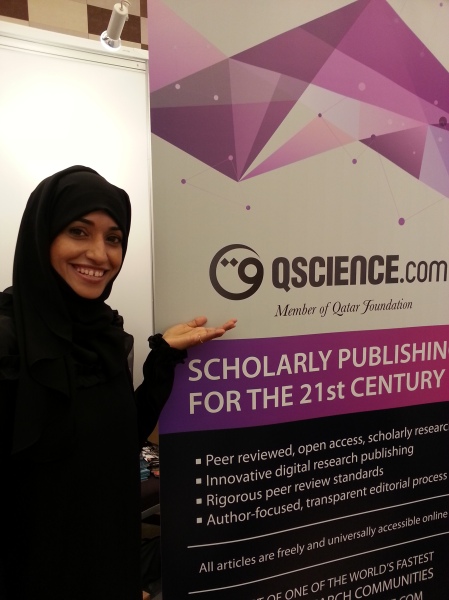While attending the 19th Annual Conference & Exhibition of the Special Libraries Association – Arabian Gulf Chapter (SLA-AGC) in Abu Dhabi last week, I had the chance to speak with Affra Al Shamsi (E-library and Resource Manager in the Oman Medical Speciality Board and Head of the Medical Library at the Royal Hospital in Muscat, Oman).
She was one of the organizers of the “Health Information Under Microscope: Challenges & Solutions” symposium that took place between 13-14 February, 2013 . The symposium was a collaboration between Sultan Qaboos University (College of Arts & Social Science and Medical library), Royal Hospital Medical library, Oman Medical Specialty Board and the SLA-AGC.
“librarians need to stand up, need to be more outspoken, and need to believe more in themselves”
Interview with Affra Al Shamsi (Thursday 25 April 2013):
[Alwaleed Alkhaja]: Hello Affra, and thank you for meeting with me. First, can you tell us about the history of the medical information symposium that took place in Oman?
[Affra Al Shamsi] :We started the symposium as an open day in 2005 in the Royal Hospital. The idea was to link up the doctors with the biomedical professionals along with the librarians and the publishers and to make transparent environments to discuss and share their thoughts and fears. It was successful, so we decided to do it every year. It eventually grew to become a conference for the Royal Hospital. We invited everyone from around Oman and we brought international speakers. Slowly, it started having a reputation, and people were coming from everyone, not just Oman. In 2012, it was the first year that we decided to merge it with Special Libraries Association (SLA), to give it more visibility for the whole region. It was a success. Since then, we have had a very good number of doctors attending, as well as nurses, pharmacists and others in the biomedical field. It is the only type of [regional] symposium that talks about information the medical field. All other events talk about medical practice and not information.
How was this year’s symposium in February different from other years?
This year we tried to make it more practical. I believe people learn more when they do things than just listening. We added a program that was more focused on practice. We had about five workshops and two tutorials and other lectures. We added ‘Training the Trainer’, which was novel. Instead of publishers giving lectures about their products, we made it more about training the attendees, to make them more aware of their products and how to use them. These workshops had a huge attendance. People really liked it!
Why do you think was the most successful part, that got the most attention?
There were two things: the workshops and ‘Training the Trainer’ sessions. The workshops were on key issues. We had international and local speakers. It was very interesting for people to attend.
Now, somewhat of a different question. What are some of the challenges faced by medical libraries in Oman?
It is not only in Oman. I think it is all around the region. It is budgets. Budget comes first usually. Then the second thing is the value of the librarians. Still, it [value of librarians] is not clear for many people, especially the decision makers. There is a lack of support for libraries and library-related projects.
What are some recommendations that might help the situation?
I think to fix this, librarians need to stand up, need to be more outspoken, and need to believe more in themselves and their message. Once they do that, they will get the attention from others to support them.
Do you think SLA will give you this support in Oman and help find you solutions to these problems?
Unfortunately there is not much support from the association. They can’t. I think legally and politically, they are not allowed to yet. But from the recommendations [from the SLA AGC 2013 conference] I heard yesterday, some of the libraries raised some of these issues. It was about creating better job descriptions, better library structures. And if the association will send these recommendations throughout the region, it will be the first step for the association to show its position in supporting the libraries, because until now, many of the libraries do not have proper job descriptions. Within the same country, each institution has different job descriptions and titles for librarians, as well as different salaries. How can we have much rule or influence if we still don’t have any kind of identify?
What’s next for your symposium next year? Anything special planned?
We have been approached by different countries in the region who want us to move it or rotate it in the region. This means that the symposium would be more regional like the main SLA conference.
QScience.com is an open access publisher, what is your opinion on open access?
I want to salute all open access publishers. Because as much as we librarians struggle for budgets, open access helps us with the first step. It has big value for us!
For more information on QScience.com librarians’ resources:
http://www.qscience.com/page/librarians_resources
For more information about the Special Libraries Association – Arabian Gulf Chapter (SLA-AGC): http://arabiangulf.sla.org/
For more information about the Royal Hospital Medical Library:
http://www.royalhospital.med.om/medical_library.htm
-Alwaleed Alkhaja, PhD.

